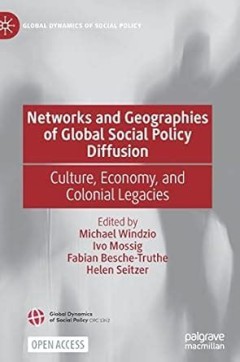Filter by

The Future of Education Policy in the State of Qatar
This open access book provides a topical overview of education, development plans, the knowledge economy, and human development in the State of Qatar, focusing on socio-political and cultural challenges, from a policy perspective. It describes the ecosystem of education and its features, impacts, and the factors that facilitate or inhibit its current shape and development, including the pendulu…
- Edition
- -
- ISBN/ISSN
- 9789819796663
- Collation
- XXII, 519 hlm; ill., lamp.,
- Series Title
- -
- Call Number
- -

State-Managed International Voluntary Service
People stopped moving across borders during the COVID-19 pandemic. Travelers, businesspeople, students, migrants, refugees, diplomats, and aid workers all stayed home. Volunteers working abroad were not an exception. Volunteers of the United States Peace Corps (USPC) and Australian Volunteers International (AVI) were, for example, compelled to return home or were no longer deployed to host …
- Edition
- -
- ISBN/ISSN
- 9789819736157
- Collation
- XVIII, 277
- Series Title
- -
- Call Number
- -

Everyday Welfare in Modern British History : Experience, Expertise and Activism
This open access book offers a new approach to understandings of welfare in modern Britain. Foregrounding the agency individuals and groups claimed through experiential expertise, it traces deep connections between personal experience, welfare, and activism across diverse settings in modern Britain. The experiential experts studied in this collection include women, students, children, women who…
- Edition
- 1
- ISBN/ISSN
- 9783031649875
- Collation
- XV, 381 hlm,: ill, lamp;
- Series Title
- -
- Call Number
- -

The Lives of Extraction = Identities, Communities and the Politics of Place
The frontiers of extraction are expanding rapidly, driven by a growing demand for minerals and metals that is often motivated by sustainability considerations. Two volumes of International Development Policy are dedicated to the paradoxes and futures of green extractivism, with analyses of experiences from five continents. In this, the first of these two volumes, 16 authors offer a critical and…
- Edition
- -
- ISBN/ISSN
- 9789004685994
- Collation
- 320 hlm; ill., lamp.,
- Series Title
- International Development Policy
- Call Number
- -

International Impacts on Social Policy = Short Histories in Global Perspective
This open access book consists of 39 short essays that exemplify how interactions between inter- and trans-national interdependencies and domestic factors have shaped the dynamics of social policy in various parts of the world at different points in time. Each chapter highlights a specific type of interdependence which has been identified to provide us with a nuanced understanding of specific s…
- Edition
- 1
- ISBN/ISSN
- 9783030866457
- Collation
- XXVIII, 542 ill; hlm
- Series Title
- -
- Call Number
- -

One Hundred Years of Social Protection = The Changing Social Question in Braz…
While the rise of social protection in the global North has been widely researched, we know little about the history of social protection in the global South. This volume investigates the experiences of four middle-income countries - Brazil, India, China and South Africa - from 1920 to 2020, analysing if, when, and how these countries articulated a concern about social issues and social cohesio…
- Edition
- 1
- ISBN/ISSN
- 9783030549596
- Collation
- XXIV, 437 ill; hlm
- Series Title
- -
- Call Number
- -

Causal Mechanisms in the Global Development of Social Policies
This open access edited volume introduces the concept of causal mechanisms to explore new ways of explaining the global dynamics of social policy, and shows that a mechanism-based approach provides several advantages over established approaches for studying social policy The introductory chapter outlines the mechanism-based approach, which stands out by modularisation and a clear focus on acto…
- Edition
- 1
- ISBN/ISSN
- 9783030910884
- Collation
- XIX, 457ill; lamp
- Series Title
- -
- Call Number
- -

Networks and Geographies of Global Social Policy Diffusion = Culture, Economy…
This open access book analyses the global diffusion of social policy as a process driven by multiplex ties between countries in global social networks. The contributions analyze links between countries via global trade, colonial history, similarity in culture, and spatial proximity. Networks are viewed as the structural backbone of the diffusion process, and diffusion is anlaysed via several su…
- Edition
- 1
- ISBN/ISSN
- 9783030834036
- Collation
- XVI, 272 ill; lamp
- Series Title
- -
- Call Number
- -

Hot Property = The Housing Market in Major Cities
Dr. Rob Nijskens Rob is an economist in the Financial Stability Division of DNB since 2012, specializing in analyzing financial stability risks in commercial and residential real estate markets. Together with Melanie Lohuis and Willem Heeringa he authored the 2017 DNB Occasional Study “The housing market in major Dutch cities”. He has also written extensively on commercial real estate, bot…
- Edition
- 1
- ISBN/ISSN
- 9783030116743
- Collation
- XVI, 221 ill; lamp
- Series Title
- -
- Call Number
- -

Civil Society Elites in the Italian Third Sector : A Comparative Perspective
This open access book unveils the hidden elite of Italy's third sector, offering a rare glimpse into the lives and minds of civil society's most influential leaders. Bridging elite and civil society studies, it presents pioneering research on these powerful yet understudied figures. Through in-depth analysis, the chapters reveal surprising insights about the elite's composition, attitudes, care…
- Edition
- 1
- ISBN/ISSN
- 9783031714443
- Collation
- XI, 152 hlm; ill., lamp.,
- Series Title
- -
- Call Number
- -
 Computer Science, Information & General Works
Computer Science, Information & General Works  Philosophy & Psychology
Philosophy & Psychology  Religion
Religion  Social Sciences
Social Sciences  Language
Language  Pure Science
Pure Science  Applied Sciences
Applied Sciences  Art & Recreation
Art & Recreation  Literature
Literature  History & Geography
History & Geography